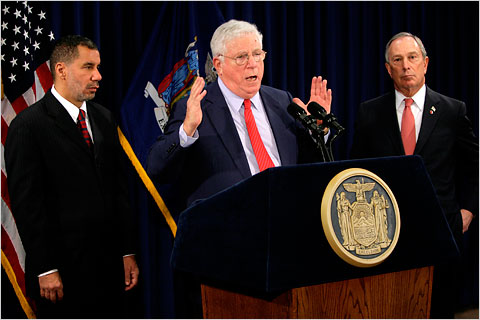More on the Ravitch Commission’s MTA Fix
 Photo: New York Times
Photo: New York TimesBrad hit the major points from today’s Ravitch/Paterson/Bloomberg press conference. Here are some more details on the MTA rescue plan they unveiled. (The whole Ravitch Commission report is available as a PDF.)
- Bridge tolls would be cashless, using E-ZPass and license plate capture
technology, not toll booths. The city would transfer ownership of East
and Harlem River bridges to the MTA. Ravitch described this process as
"very complicated" and said discussions were ongoing, but did not
specify which legislative approvals would be required. - The payroll tax, expected to generate $1.5 billion yearly, would be used to finance bonds for the MTA capital program. Ravitch described this as a lockbox structure that would keep farebox revenue separate from capital funding. (The underlying principle is that straphangers should pay for operating the system, not the capital program.) An exception would be made during the first year the tax is in effect, when it would be used to stave off deep service cuts and hold down the fare hike to eight percent, as opposed to the 23 percent hike that was unveiled last month. The state legislature will have to approve the tax.
- Bus service would be extended before the bridge tolls take effect. Ravitch endorsed BRT as a vital component of the rescue package, but did not give specifics about the number of lines to be added. He referred instead to the city’s plan for pilot routes in every borough. "The more we’re able to demonstrate to the public that this is a good thing, the better," he said.
- Expect action in the state legislature soon. "Time is critical because the MTA is required by law to adopt a balanced budget in December," Ravitch said. The fare increase process will start in January if the legislature does not act by then.
Paterson and Bloomberg gave the plan full endorsements, with the governor portraying its release as a day of reckoning. "The delays, the ways in which responsibility has been shirked if not just ignored in the past, to live for another day — that day has come," he said.
City Room has a good run-down of the press event and some early reactions from advocacy groups and local pols. Looks like many of our electeds see the commuter tax and car registration fees as their preferred alternatives to bridge tolls.